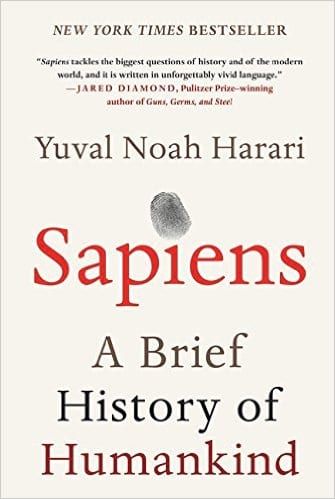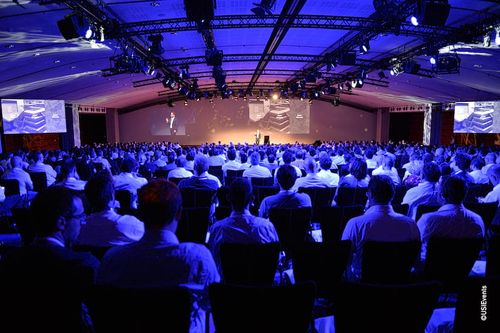Interview with Yuval Noah Harari : "Our successors may not be human at all..."

1. What do you find most fascinating about Sapiens?
The immense power of our imagination, and our ability to construct entire worlds of fantasy – and then act as if they are real. This is what enables us to cooperate in our millions and dominate the planet.
Humans have no “mass cooperation instincts”. We can cooperate with strangers because we can invent stories about things that exist only in our imagination – things such as gods, nations, money, or human rights – and spread them to millions of other people. When millions of people all believe in the same imaginary stories, they follow the same laws.
Chimpanzees cannot do that. You can never convince a chimpanzee to give you a banana by promising him that after he dies, he will go to chimpanzee Heaven, and there receive limitless bananas for his good deeds. Only Sapiens can invent and believe such stories. This is why we rule the planet, and not the chimpanzees.
2. Because of technology, we Sapiens are evolving ourselves and will ultimately come to disappear. If Sapiens disappears, what new species of human will emerge?
There are two main options. Either we will use technology to upgrade ourselves into some kind of superhumans possessing divine powers.
Or we will change the most basic rules of the game of life, and create completely new kinds of beings, which are not even organic.
Ever since the appearance of life on earth, four billion years ago, life was governed by the laws of natural selection. During all these eons, whether you were a virus or a dinosaur, you evolved according the principles of natural selection. In addition, no matter what strange and bizarre shapes life undertook, it remained confined to the organic realm. Whether a cactus or a whale, you were made of organic compounds.
Now human science might replace natural selection with intelligent design, and might even start creating non-organic life forms. After four billion years of organic life shaped by natural selection, science is ushering the era of inorganic life shaped by intelligent design.
So our successors may not be human at all – they might not even be organic.
3. How Sapiens are we still? For example, you mention "gorging-gene", a habit that should have died out, yet still persists. Could this be an example of Sapiens evolving too quickly?
We are still very similar to our Stone Age ancestors. Throughout history there were many economic, social and political revolutions, but humanity itself hardly changed. We still have the same body and mind as our Stone Age ancestors.
For example, why do modern humans love sweets so much? Not because in the early twenty-first century we must gorge on ice cream and chocolate in order to survive. Rather, it is because if our Stone Age ancestors came across sweet fruit or honey, the most sensible thing to do was to eat as much of it as quickly as possible.
Similarly, why do young men drive recklessly, get involved in violent arguments, and hack confidential Internet sites? Because they are following ancient genetic decrees, which might be useless and even counterproductive today, but which made good evolutionary sense 50,000 years ago. Back then, a young hunter who risked his life chasing a mammoth outshone all his competitors and won the hand of the local beauty; and we are now stuck with his macho genes.
Yet in the coming decades, for the first time in history, humanity itself will undergo a radical revolution. Not only our society and economy, but our bodies and minds will be transformed by genetic engineering, nanotechnology and brain-computer interfaces.
Bodies and minds will probably be the main products of the 21st century economy.

4. Isn't fighting death the most self-destructive thing we could do?
Maybe, but it is also a temptation we cannot resist. Throughout history, death was seen as a metaphysical phenomenon. We die because God decreed it, or the Cosmos, or Mother Nature. People accordingly believed that death could be defeated only by some grand metaphysical gesture such as Christ's Second Coming.
Yet lately science has redefined death as a technical problem. A very complicated problem, no doubt, but still only a technical problem. And science believes that every technical problem has some technical solution. We don’t need to wait for God or for Jesus Christ in order to overcome death. A couple of geeks in a lab could do it.
If traditionally death was the specialty of priests and theologians, now the engineers are taking over. Two years ago Google has established a sub-company called Calico, whose aim is to solve the problem of death. A number of very serious scientists believe we could overcome old age and death already in the 21st century. They point out that in the 20th century we have doubled average life expectancy from about 35-40 to 75. So we should at least be able to do so again, and at least double it to 150 by 2100.
Personally I am more skeptical. It is true that over the last 100 years average life expectancy doubled, but it is dangerous to extrapolate and conclude that it will be easy to double it again.
In pre-modern societies average life expectancy was no higher than 40, because many people died young from malnutrition, infectious diseases and violence. Yet those who escaped famine, plague and war could live well into their seventies and eighties even in ancient times.
The average natural life span of Homo sapiens seems to be somewhere between 70 and 90. So far, modern medicine didn’t extend this by a single year. Its great achievement has been to save us from premature death, and allow us to enjoy the full measure of our natural life span.
Even if we now overcome cancer, diabetes and the other major killers of our day, it will mean only that almost everyone would get to live to 90 – but it will not be enough to reach 150. For that, medicine will need to reengineer the most fundamental structures and processes of the human body. I doubt we can do that by 2050 or 2100. However, within another century or two, it might well be possible to do it, and grant unlimited lifespans at least to the rich people who could afford the necessary treatments.
5. You spend your time studying Sapiens. Does Sapiens still surprise you?
Yes. There are no strict laws in history. All the time unexpected things keep happening. Think about the Roman Empire in the third century AD. At the time, Christianity was little more than an esoteric Eastern sect. If you were to suggest then that it was about to become the Roman state religion, you’d have been laughed out of the room just as you would be today if you were to suggest that by the year 2050 Hare Krishna would be the state religion of the USA. Yet this is exactly what happened.
In October 1913, the Bolsheviks were a small radical Russian faction. No reasonable person would have predicted that within a mere four years they would take over the country. In 600 AD, the notion that a band of desert-dwelling Arabs would soon conquer an expanse stretching from the Atlantic Ocean to India was even more preposterous. Yet it happened.
Similarly, the only thing we can be certain about the world of the year 2030 is that it will surprise us.
6. This will be your first time participating in USI. The selected topic for your talk is The Sapiens Secret of Success. If you had unlimited time, what more would you have liked to teach our audience? What do you think everybody should know that might help make a positive impact on our environment?
We should be aware that even though we humans are extremely good in acquiring power, we are not very good in translating power into happiness. Hence we are today far more powerful than ever before, and our life is certainly more comfortable than in the past. Yet it is doubtful whether we are much happier than our ancestors.
One explanation is that happiness depends less on objective conditions and more on our own expectations. Expectations, however, tend to adapt to conditions. When things improve, expectations balloon, and consequently even dramatic improvements in conditions might leave us as dissatisfied as before.
A second explanation is that both our expectations and our happiness are determined by our internal biochemical system. And our biochemical system has no real interest in happiness. It was shaped by evolution to increase our chances of survival and reproduction, and evolution has made sure that no matter what we achieve, we remain dissatisfied, forever grasping for more.
At the most fundamental level, our basic reaction to pleasure is not satisfaction, but rather craving for more. Hence no matter what we achieve, it only increases our craving, not our satisfaction. This is why humankind has been so successful in conquering the world and acquiring immense power, but has not been successful in translating all that power into happiness.
7. Do you get your kicks from technology? What do you find most exciting?
I am very interested in studying the political and cultural impact of technology, but I am rarely thrilled by the gadgets themselves. I am far more excited by the mysteries of the human mind than by computers or self-driving cars.
For me, the most important question is "What is reality? What is really real, rather just fictions in my own mind?". To answer this question, we need to understand the mind. Unfortunately, so far science has had great difficulty in researching the mind, because it has no method for direct observation of the mind. You can study the brain by using microscopes and fMRI scanners, but the brain is not the mind. The problem is that the only mind accessible to you is your own mind.
You can never observe directly the mind of another person. And when you try to observe your own mind, it is extremely difficult to do so in a systematic and objective manner. Anyone who ever tried to do so knows how difficult it is to observe even the simplest mental processes for more than a few seconds without becoming distracted or overwhelmed.
That’s why I dedicate two hours every day to meditation, and every year take a long meditation retreat for a month or two.
I practice Vipassana meditation, which I have learned from a teacher called S. N. Goenka. Vipassana is a method for observing the mind in a systematic and objective manner. The mind is constantly in contact with body sensations. In every moment, we always experience some sensation on the body, and the mind reacts to it. Even when we think that we are reacting to what somebody else did, to what we saw on television, or to a childhood memory, we are in fact reacting to some bodily sensation that is present here and now.
In Vipassana one trains oneself to observe in an orderly and objective way the body sensations and the mind's reactions to them, thereby uncovering our deepest mental patterns. What I have been able to directly observe in meditation is far more exciting that any technological gadget I have so far encountered.
8. Will we have to fundamentaly change our makeup to adapt to the digital age?
Most probably, yes. If we don’t change, within a few decades AI may make most humans completely useless. We are now developing computer software and artificial intelligence that outperform humans in more and more tasks, from driving cars to diagnosing diseases. As a result, experts estimate that within 20-30 years about 50% of all the jobs in advanced economies will be taken by computers.
Many new kinds of jobs will probably appear, but that won’t necessarily solve the problem. Humans have basically just two types of skills – physical and cognitive – and if computers outperform us in both, they might outperform us in the new jobs just like in the old ones. So what will be the use of humans in such a world? What will we do with billions of economically useless humans? We don’t know.
We don’t have any economic model for such a situation. This may well be the greatest economic and political question of the twenty-first century.
9. What can we, Sapiens, teach our children to prevent them from becoming the ecological serial killers that we are today?
The difference between fiction and reality. Without fictions such as nations, gods, money or human rights large scale human societies cannot function. But we should learn to separate fiction from reality better, and see reality very clearly. We should ask ourselves "what is really real?". For most of history, people have been so obsessed with fictions that they lost touch with reality. Instead of using the fictions as tools in our service, we became enslaved to them.
One of the best tests of reality is suffering. If you want to know whether an entity is real, ask yourself: "can it suffer?". When the temple of Zeus is burned down, Zeus doesn’t suffer. When the euro loses its value, the euro doesn’t suffer. When a bank goes bankrupt, the bank doesn’t suffer. When a country suffers a defeat in war, the country doesn’t really suffer. It's just a metaphor. In contrast, when a soldier is wounded in battle, he really does suffer. When an investor loses all her wealth in a stock-exchange bubble, she suffers. When a cow in an industrialized farm is separated from her newly-born calf, she suffers.
This is reality.



